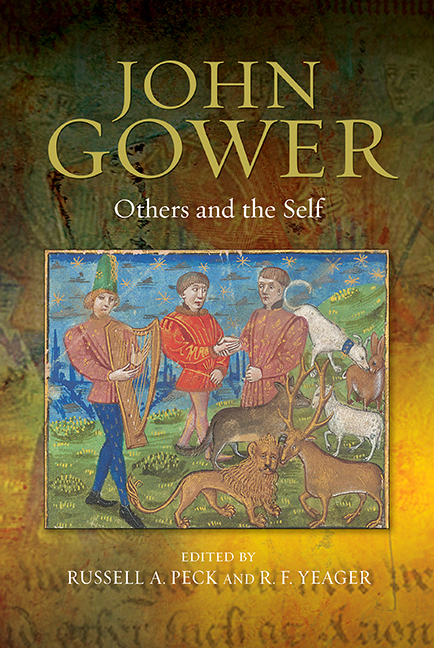Book contents
- Frontmatter
- Contents
- List of Illustrations
- Abbreviations
- Introduction
- PART I KNOWING THE SELF AND OTHERS
- PART II THE ESSENCE OF STRANGERS
- PART III SOCIAL ETHICS, ETHICAL POETICS
- 11 Gower's Governmentality: Revisiting John Gower as a Constitutional Thinker and Regiminal Writer
- 12 Gower's Speculum Iudicis: Judicial Corruption in Book VI of the Vox Clamantis
- 13 “The Lucre of Marchandie”: Poet, Patron, and Payment in Gower's Confessio Amantis
- 14 Hidden Matter in John Gower's Confessio Amantis
- 15 Writing the Cinkante Balades
- 16 Gower in Early Modern Spanish Libraries: The Missing Link
- Bibliography
- Index
- VOLUMES ALREADY PUBLISHED
14 - Hidden Matter in John Gower's Confessio Amantis
from PART III - SOCIAL ETHICS, ETHICAL POETICS
Published online by Cambridge University Press: 30 April 2019
- Frontmatter
- Contents
- List of Illustrations
- Abbreviations
- Introduction
- PART I KNOWING THE SELF AND OTHERS
- PART II THE ESSENCE OF STRANGERS
- PART III SOCIAL ETHICS, ETHICAL POETICS
- 11 Gower's Governmentality: Revisiting John Gower as a Constitutional Thinker and Regiminal Writer
- 12 Gower's Speculum Iudicis: Judicial Corruption in Book VI of the Vox Clamantis
- 13 “The Lucre of Marchandie”: Poet, Patron, and Payment in Gower's Confessio Amantis
- 14 Hidden Matter in John Gower's Confessio Amantis
- 15 Writing the Cinkante Balades
- 16 Gower in Early Modern Spanish Libraries: The Missing Link
- Bibliography
- Index
- VOLUMES ALREADY PUBLISHED
Summary
What's the matter with John Gower? I ask this intentionally playful question to ponder two things: first, how does Gower employ literal and metaphorical discussions of the material in his great English poem, the Confessio Amantis? Second, how does matter itself—both real and literary—affect readers’ ability to interpret their environment? In short, how does stuff inhibit or encourage our understanding of the natural world? As numerous scholars have observed, the Confessio is studded with descriptions of crafted things. They are often read either as “object models,” to quote Robert F. Yeager, and thus function primarily as narrative symbols, or are part of Gower's political and economic narrative, as the work of Brian Gastle and Roger Ladd has shown. But what joins many of these references to the material and crafted world—artificial to use Aristotle's term—is an anxiety about the ways in which such goods are both produced and used. In the “Trump of Death,” in Book I, a king orders made a particular “trompe of bras” to be sounded with a “with a sterne breth” in order to trick his brother into believing that he has been condemned to death by a whim. Likewise, Gower deploys the classic tale of the Trojan Horse to demonstrate that manufactured goods have the potential for danger. The reason we should not trust Greeks bearing gifts is not abstract; it is a giant beautiful “hors of bras thei let do forge” (CA I.1087), skillfully designed by the “crafti werkman Epius” (CA I.1091), and soon to be filled with marauding soldiers. In both examples, the rich materials and fine craftsmanship overpower reason through the gates of the senses. Objects do not just appear in Gower's reworked exempla; they are ordered by kings and patrons and made by the hands of skilled artisans. As a result, Gower compels us not only to consider the symbolic or economic value of things, but also encourages us to read the matter and craft used to produce such goods.
As I will argue in this essay, debates about matter and form illustrate different anxieties about the power that crafted goods can have over human observers and handlers.
- Type
- Chapter
- Information
- John Gower: Others and the Self , pp. 295 - 305Publisher: Boydell & BrewerPrint publication year: 2017

